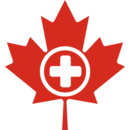| Part of a series on |
| Healthcare in Canada |
|---|
 |
|
|
 The Doctor by Luke Fildes (detail)[1] | |
| Occupation | |
|---|---|
| Names | Physician, medical practitioner, medical doctor or simply doctor |
Occupation type | Professional |
Activity sectors | Medicine, health care |
| Description | |
| Competencies | The ethics, art and science of medicine, analytical skills, critical thinking |
Education required | MBBS, MD, MDCM, or DO |
Fields of employment | Clinics, hospitals, government |
Related jobs | General practitioner Family physician Surgeon Specialist physician |
Physicians and surgeons play an important role in the provision of health care in Canada. They are responsible for the promotion, maintenance, and restoration of health through the study, diagnosis, prognosis, and treatment of disease, injury, and other physical and mental impairments. As Canadian medical schools solely offer the Doctor of Medicine (M.D.) or Doctor of Medicine and Master of Surgery (M.D., C.M.) degrees, these represent the degrees held by the vast majority of physicians and surgeons in Canada, though some have a Doctor of Osteopathic Medicine (D.O.) from the United States or Bachelor of Medicine, Bachelor of Surgery (M.B., B.S.) from Europe.
In order to practice in a Canadian province or territory, physicians and surgeons must obtain certification from either the College of Family Physicians of Canada (CFPC) or the Royal College of Physicians and Surgeons of Canada (RCPSC), as well as become members of the provincial or territorial medical professional regulatory authority.
- ^ In 1949, Fildes' painting The Doctor was used by the American Medical Association in a campaign against a proposal for nationalized medical care put forth by President Harry S. Truman. The image was used in posters and brochures along with the slogan, "Keep Politics Out of this Picture" implying that involvement of the government in medical care would negatively affect the quality of care. 65,000 Posters of The Doctor were displayed, which helped to raise public skepticism for the nationalized healthcare campaign.